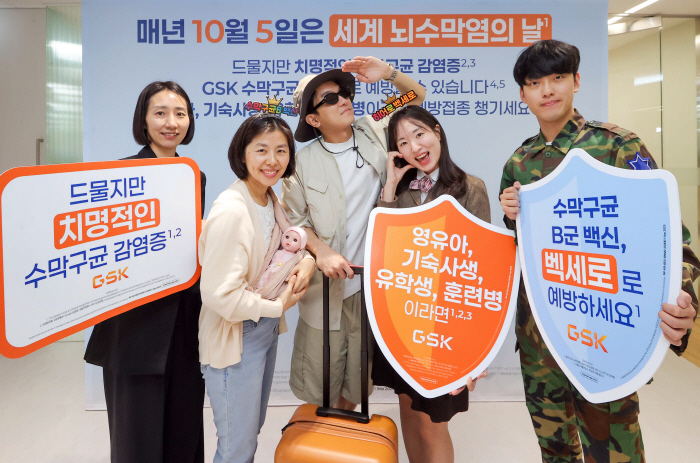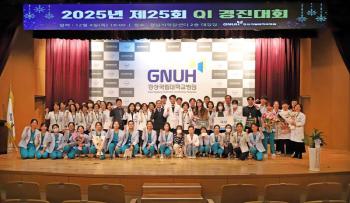October 5th World Meningitis Day...GSK of Korea supports vaccination of meningococcal group B vaccine with Vexero for family members of executives and employees
October 5 is 'World Meningitis Day'.
Meningococcal infections are acute infections caused by Neisseria meningitidis, which mainly cause meningitis and sepsis. Initially, it begins with flu-like symptoms such as fever and headache, but can worsen rapidly within just 24 hours and lead to death.
According to domestic and international statistics, prevention of infants and toddlers under the age of 1 is important because the cumulative number of cases is higher than that of other age groups. Meningococcal infections have a mortality rate of 50% without proper treatment, and a mortality rate of 10% to 14% even with proper treatment. In addition, even if they survive, about 10% to 20% of survivors suffer permanent sequelae such as limb amputation and hearing loss.
The Confederation of Meningitis Organizations (CoMO) has designated October 5th as World Meningitis Day every year, and campaigns to raise global awareness and overcome the disease.
The three major bacteria that cause meningitis are type B hemophilus influenzae (Hib), pneumococci, and meningococci. Hib and pneumococcus can be prevented through the National Vaccination Program (NIP), but meningococcus is not included, causing vaccination blind spots. Last year, 17 cases of meningococcal infection were reported in Korea, and three of them died. Although it occurs rarely in Korea, with a total of 224 cases between 2001 and 2023, prevention through vaccines is emphasized as an effective countermeasure due to the high fatality rate in case of infection.
Most of the meningococcal infections reported to date are caused by six serogroups (A, B, C, W, X, and Y), but B serogroups are high at home and abroad. In particular, Southeast Asia and the United States, which are frequently visited by domestic travelers, are among the countries where the B serum group is widely reported. Meningococcal infections require immediate antibiotic administration if they are suspected to be a disease that progresses fast enough to die within 24 hours, but prevention is more important because access to treatment is not smooth during travel, which can lead to missed treatment or delayed treatment.
The meningococcal vaccine recommendations include high-risk groups for the occurrence of meningococcal diseases (if complement deficiency, anatomical or functional uncritical, microbiological personnel who usually deal with HIV infection, meningococcal infections, stay in epidemic areas, and travelers), military recruits considered for vaccination, freshmen at middle and high schools and universities living in dormitories, and countries visiting to study. In particular, 11 cases of invasive meningococcal disease occurred in boot camp from 2008 to 2012, and this led to the start of a tetravalent meningococcal vaccination program at boot camp from November 2012. However, meningococcal B vaccination, which has a high reporting rate at home and abroad, has not yet been provided, so pre-admission vaccination is necessary. Cases of mass outbreaks have also been reported at international events such as Jamboree.
In this regard, GSK Korea announced that it will provide training to employees to inform them of the risk of meningococcal infections and provide vaccination for infants under 24 months, those who are expected to join the military, and family members of executives and employees living in dormitories in middle and high schools and universities.
GSK's Vexero is a meningococcal B vaccine containing four major antigens of the meningococcal B serogroup, which can prevent invasive meningococcal disease caused by the B serogroup at least 2 months of age. Since it was first authorized in Europe in 2013, vaccinations have been available in Korea since 2024, and as of February 2025, it is included in the national vaccination program in 19 countries.
GSK Korea wanted to protect the health of employees and their families through Vexero vaccination support, while also reminding them of the risk of meningococcal infections and conveying the need for vaccination through training for employees. In addition, executives and employees wore costumes symbolizing the target of meningococcal vaccination, such as infant and parents' clothes, military uniforms, uniforms, and travelers' clothes, and participated in filming with a board containing a preventive message to inform the need for prevention.
Meningococcal infections are acute infections caused by Neisseria meningitidis, which mainly cause meningitis and sepsis. Initially, it begins with flu-like symptoms such as fever and headache, but can worsen rapidly within just 24 hours and lead to death.
According to domestic and international statistics, prevention of infants and toddlers under the age of 1 is important because the cumulative number of cases is higher than that of other age groups. Meningococcal infections have a mortality rate of 50% without proper treatment, and a mortality rate of 10% to 14% even with proper treatment. In addition, even if they survive, about 10% to 20% of survivors suffer permanent sequelae such as limb amputation and hearing loss.
The Confederation of Meningitis Organizations (CoMO) has designated October 5th as World Meningitis Day every year, and campaigns to raise global awareness and overcome the disease.
The three major bacteria that cause meningitis are type B hemophilus influenzae (Hib), pneumococci, and meningococci. Hib and pneumococcus can be prevented through the National Vaccination Program (NIP), but meningococcus is not included, causing vaccination blind spots. Last year, 17 cases of meningococcal infection were reported in Korea, and three of them died. Although it occurs rarely in Korea, with a total of 224 cases between 2001 and 2023, prevention through vaccines is emphasized as an effective countermeasure due to the high fatality rate in case of infection.
Most of the meningococcal infections reported to date are caused by six serogroups (A, B, C, W, X, and Y), but B serogroups are high at home and abroad. In particular, Southeast Asia and the United States, which are frequently visited by domestic travelers, are among the countries where the B serum group is widely reported. Meningococcal infections require immediate antibiotic administration if they are suspected to be a disease that progresses fast enough to die within 24 hours, but prevention is more important because access to treatment is not smooth during travel, which can lead to missed treatment or delayed treatment.
The meningococcal vaccine recommendations include high-risk groups for the occurrence of meningococcal diseases (if complement deficiency, anatomical or functional uncritical, microbiological personnel who usually deal with HIV infection, meningococcal infections, stay in epidemic areas, and travelers), military recruits considered for vaccination, freshmen at middle and high schools and universities living in dormitories, and countries visiting to study. In particular, 11 cases of invasive meningococcal disease occurred in boot camp from 2008 to 2012, and this led to the start of a tetravalent meningococcal vaccination program at boot camp from November 2012. However, meningococcal B vaccination, which has a high reporting rate at home and abroad, has not yet been provided, so pre-admission vaccination is necessary. Cases of mass outbreaks have also been reported at international events such as Jamboree.
|
GSK's Vexero is a meningococcal B vaccine containing four major antigens of the meningococcal B serogroup, which can prevent invasive meningococcal disease caused by the B serogroup at least 2 months of age. Since it was first authorized in Europe in 2013, vaccinations have been available in Korea since 2024, and as of February 2025, it is included in the national vaccination program in 19 countries.
GSK Korea wanted to protect the health of employees and their families through Vexero vaccination support, while also reminding them of the risk of meningococcal infections and conveying the need for vaccination through training for employees. In addition, executives and employees wore costumes symbolizing the target of meningococcal vaccination, such as infant and parents' clothes, military uniforms, uniforms, and travelers' clothes, and participated in filming with a board containing a preventive message to inform the need for prevention.
This article was translated by Naver AI translator.




